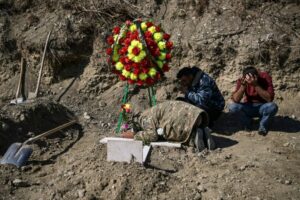Far from the world’s attention, the war between Azerbaijan and Armenia is raging. The dispute is over Nagorno-Karabakh, a land historically populated by Armenians. Civilian and military casualties continue to pile up. Until now, the European Union, its member states, the United States and the other major democracies have remained silent or even washed their hands of the affair by opting for convenient neutrality between the two belligerents.
For the EU and its member states to take such a position is politically untenable and morally unjustifiable. There are various reasons for this:
- The president of Azerbaijan, Ilham Aliyev, committed a major political misdeed by accepting military support from Recep Erdogan’s Turkey, heir of the Young Turks’ regime which was responsible for the genocide of Armenians on Turkish territory (1915-16, at least 1.2 million victims) and the ethnic cleansing of vast regions hitherto inhabited mainly by Armenians for centuries.
- Nagorno-Karabakh’s incorporation into the Soviet Republic of Azerbaijan in 1921 was simply the result of a territorial carve-up devised by the sick and criminal mind of Joseph Stalin.
- The authorities of Azerbaijan, as the instigator of this new war, have opted for massive bombing of the civilian population of Nagorno-Karabakh.
- The Azerbaijani president, at the suggestion and with the help of Recep Erdogan’s regime, has welcomed at least 1,500 mercenaries from Syria.
- During almost two decades in power, the Azerbaijani government of President Ilham Aliev has not adopted a single reform aimed at democratising the autocratic regime inherited from the president’s father Gaydar Aliev. Arrests and imprisonment of any dissenting voices remain the ironclad rule, thus constituting an insurmountable obstacle for the Armenians of Nagorno Karabakh in their possible integration into the Republic of Azerbaijan.
- Despite many dysfunctions, and particularly since the Velvet Revolution of 2018, the current regime in Armenia meets many of the basic requirements of a democratic system.
- The status quo in force since the 1990s between Azerbaijan and Armenia does not offer any possibility of finding a lasting peace agreement between the two sides.
- This status quo benefits first and foremost the Russian regime of Vladimir Putin.
The Atlantic democracies and the European Union should understand that the « Erdogan problem » is their problem even when Turkey’s nationalist agenda moves outside the Mediterranean basin. The more the Turkish president expands his international influence, the more he exacerbates the problem that Turkey now represents for NATO and the EU.
For these reasons, and in order to create the basis for serious negotiations between Azerbaijan and Armenia, there is no alternative but to recognise the independence of Nagorno-Karabakh.
Only on the basis of such a recognition will it be possible to find a compromise – inspired, for example, by the Goble proposal of the 1990s – which might ensure territorial continuity between Azerbaijan and Nakhichevan on the one hand, and between Armenia and Nagorno-Karabakh on the other, and which might create the security conditions that would enable Armenia to return the currently occupied Azerbaijani districts around Nagorno-Karabakh to Azerbaijan.
It goes without saying that such international recognition of Nagorno-Karabakh could only help in breaking with the post-1994 status quo, and could only be a means of halting the current war, if it were the joint act of many democratic countries and, in particular, of the United States and the member states of the European Union.







